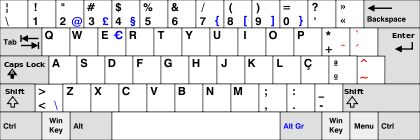Languages of Portugal
| Languages of Portugal | |
|---|---|
| Official languages | Portuguese |
| Main foreign languages |
English (32%) French (24%) Spanish (9%) |
| Sign languages | Portuguese Sign Language |
| Common keyboard layouts |
 |
| Source | ebs_243_en.pdf (europa.eu) |
The languages of Portugal are the languages spoken or once spoken in the territory of the country of Portugal.
Modern
Portuguese is practically universal in Portugal, but there are some specificities.

Portuguese dialects of Portugal
- Portuguese language (European Portuguese), with the following dialects:
- The Southern and Central dialects - They include the dialect of the capital, Lisbon, which, however, has some peculiarities of its own. Although the dialects of the Atlantic archipelagos of the Azores and Madeira have unique characteristics, as well, they can also be grouped with the southern dialects.
- 1 -
 Açoriano — Azores
Açoriano — Azores - 2 -
 Alentejano — Alentejo
Alentejano — Alentejo - 3 -
 Algarvio — Algarve (there is a particular small dialect in the western area)
Algarvio — Algarve (there is a particular small dialect in the western area) - 5 -
 Baixo-Beirão; Alto-Alentejano — Central Portugal (interior)
Baixo-Beirão; Alto-Alentejano — Central Portugal (interior) - 6 -
 Beirão — central Portugal
Beirão — central Portugal - 7 -
 Estremenho — Regions of Coimbra and Lisbon (can be subdivided in Lisbon Portuguese and Coimbra Portuguese)
Estremenho — Regions of Coimbra and Lisbon (can be subdivided in Lisbon Portuguese and Coimbra Portuguese) - 8 -
 Madeirense — Madeira
Madeirense — Madeira
- 1 -
- The Northern dialects - This includes the dialect of Porto, Portugal's second largest city.
- 4 -
 Alto-Minhoto — North of Braga (interior)
Alto-Minhoto — North of Braga (interior) - 9 -
 Nortenho — Regions of Braga and Porto
Nortenho — Regions of Braga and Porto - 10 -
 Transmontano — Trás-os-Montes
Transmontano — Trás-os-Montes
- 4 -
- Barranquenho - In the town of Barrancos (in the border between Extremadura, Andalusia and Portugal), a dialect of Portuguese heavily influenced by Extremaduran is spoken, known as Barranquenho.
- Minderico - a sociolect or argot spoken in Minde, practically extinct
- The Southern and Central dialects - They include the dialect of the capital, Lisbon, which, however, has some peculiarities of its own. Although the dialects of the Atlantic archipelagos of the Azores and Madeira have unique characteristics, as well, they can also be grouped with the southern dialects.
- Mirandese language - A dialect of Astur-Leonese spoken in Miranda do Douro in northeastern Portugal, recognized officially as a minority language in 1999.
- Portuguese Sign Language
Historically
Other languages have been extensively spoken in the territory of modern Portugal:
Pre-Roman languages
Main article: Paleohispanic languages
Pre-Roman languages of Iberia c. 200 BC.
Roman, Post-Roman and Medieval languages
See also
External links
- Detailed map of the Pre-Roman Peoples of Iberia (around 200 BC)
- Detailed linguistic map of the Iberian Peninsula
This article is issued from Wikipedia - version of the 9/12/2016. The text is available under the Creative Commons Attribution/Share Alike but additional terms may apply for the media files.